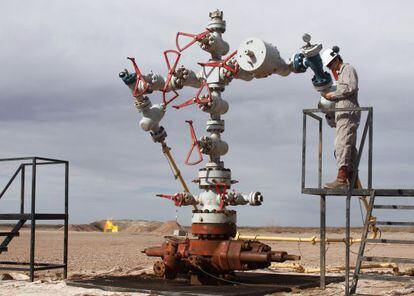Argentinean Senate approves YPF grab
Peronists mull whether to "punish" firms for doing business with dictatorship

The Argentinean Senate overwhelmingly approved the YPF nationalization bill late on Thursday, a majority voting in favor of the 19 articles that make up a law aimed at backing President Cristina Fernández de Kirchner's April 16 decree to seize the virtual totality of Repsol's 57.4-percent stake in YPF. The bill will go to the lower chamber for debate on May 3.
The expropriation of the Repsol affiliate has soured relations between Buenos Aires and Madrid, and Spanish officials this week began seeking support from the European Union to sanction Argentina, including the possible cancelation of free-trade negotiations with the Southern Cone nation.
But despite the rhetoric, diplomatic sources say that King Juan Carlos will still invite President Fernández to the Ibero-American Summit, to be held November 16-17 in Cádiz. The sources explain that the monarch cannot snub the Argentinean leader because her country is a member of the IberoAmerican Community of Nations. A separate matter, they say, is whether Fernández de Kirchner will decide to attend the summit if tensions do not ease in the meantime.
In Argentina, reports have surfaced that Axel Kicillof, the deputy economy minister who was said to have been behind the expropriation, and a group of researchers from the Peronist youth organization La Cámpora, are now looking at "punishing" foreign and local companies still operating in the country that profited from doing business with the 1976-83 military dictatorship.
Buenos Aires is worried about gas shortages with winter approaching
According to the Buenos Aires daily La Cronista, the team is studying whether certain firms committed economic crimes or took part directly or indirectly in human rights abuses during the Dirty War. Among the companies under scrutiny are Ford, Mercedes Benz, Acindar, Fiat, Tensa, Techint, Banco de Italia and First Bank of America. Press reports also say that the government is mulling the expropriation of Endesa's Argentinean affiliate Edesur in the coming weeks. The move could set off renewed tensions with Spain and a fresh flare up with Italy, which partly owns Enel, the utility that has a 92-percent stake in Endesa.
The Argentinean Planning Ministry is worried about gas shortages occurring now that the Southern Hemisphere winter is approaching. The daily Clarín reported Wednesday that planning officials fear that Repsol will cancel 10 boats carrying gas shipments that were ordered by the Spanish oil firm late last year.
The newspaper also reported that the Argentinean government has embarked on a series of diplomatic strategies in Washington to explain the government's decision to seize YPF. Economy Minister Hernán Lorenzino met privately last Friday with Robert Hormat, deputy US secretary of state for economic affairs. At the same time Argentina's ambassador to Washington, Jorge Argüello, sent out "a newsletter" to Obama administration officials and lawmakers offering his government's explanations for the YPF takeover.
In what appears to be a series of regular mailings, the first newsletter also discusses the government's position on the Falklands, "vulture funds" - a special fund set up by the government to pay its foreign debt obligations - and the rocketing US sales of Argentina's Malbec wines.










































